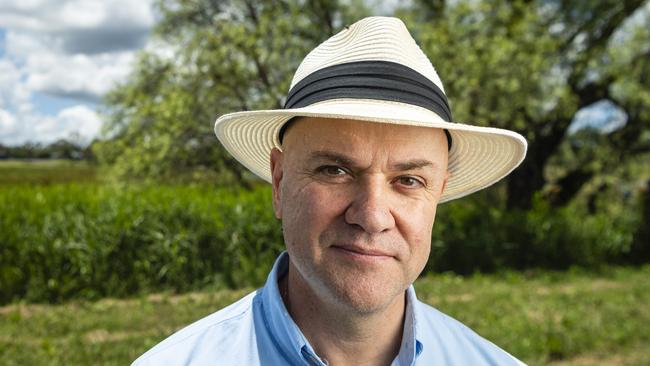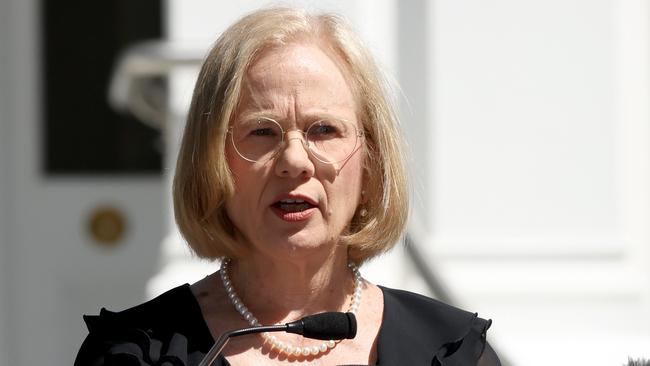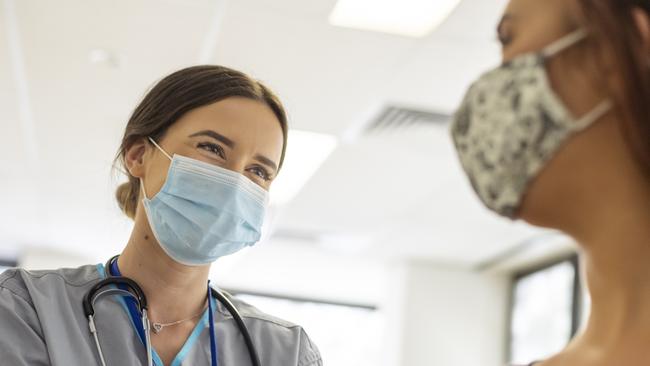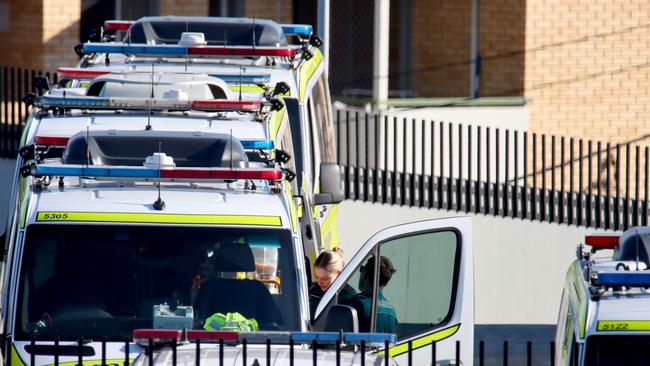Promising signs virus is losing its bite, says Qld top doctor Gerrard
A year after Queensland’s borders full reopened, Queensland’s chief health officer Dr John Gerrard reveals the next big Covid-19 hurdle as authorities test the theory the deadly virus will ‘fade into the background’.
News
Don't miss out on the headlines from News. Followed categories will be added to My News.
Australia will face its next big hurdle in the fight against Covid-19 when winter hits as authorities test the theory that the deadly virus will “fade into the background”.
In an exclusive interview with The Courier-Mail marking 12 months since our borders reopened, Queensland’s chief health officer Dr John Gerrard revealed his hope that as the virus continues to mutate, it will render itself ineffective in causing serious illness in the general population.
“The theory is that the virus can only mutate so much,” he said.
“If it mutates too much, then it won’t be an effective virus … it can only change so much before it becomes less pathogenic, less serious.”
Now in our fourth wave of the virus, the number of positive cases has risen to 13,632 in the past week – an increase of 21 per cent compared to the previous week.
Dr Gerrard said the rate of infections meant people were advised to wear a mask in health care settings, indoors if they could not socially-distance, and on public transport.

Surveillance of the virus and its many mutations remains a high priority for Queensland
Health because though seemingly more unlikely, there is still the chance a completely new variant could emerge that is worse than previous waves.
“The indicators are positive so far, but it’s not impossible,” Dr Gerrard said.
“Or is our immunity enough now that it will slowly fade into the background?
“There is a general belief, and I think it’s fair to say, that the virus does seem to be becoming more seasonal.
“So next winter is probably the next big test for us, in Australia.”
And while the top doctor says he is happy for the most part with how Queenslanders are continuing to respond to the threat of Covid, he has been let down by the number of people who have not stayed up to date with their jabs.
“It would have been it would be nice to see a few more people be up to date with their vaccinations, particularly that fourth dose … it’s a bit disappointing that there are still people who aren’t up to date with their vaccination when they’re over the age of 50,” Dr Gerrard said.
“We know that would reduce the number of hospitalisation that we’ve been seeing.”
After years of being cut off from the rest of the world and more often than not the nation, Queenslanders were finally given the news they been waiting for – borders would open in time for Christmas, on December 13 2021.
It would also be the date that the new chief health officer took over from his extremely experienced predecessor and current Queensland Governor, Jeannette Young.

The state’s hard line approach to keeping the virus at bay saw businesses crippled but it was the heartbreaking human toll that will stay etched in the mind of the thousands who missed weddings, funerals and births.
But as far the Queensland government is concerned the draconian measures not only protected the public but also its under pressure health system.
“It really is amazing that Queenslanders were protected from this virus for two years, through those incredibly strict measures, allowing them to get vaccinated and also allowing antiviral medications to be developed,” Dr Gerrard said.
“Nothing short of what was done, I think would have worked, nothing.
“It couldn’t be half measures would not have worked would not have stopped the virus.
“And it was that it was stopping the virus that allowed Queenslanders to get vaccinated and I’m giving full credit to Jeanette Young here because I was not part of that decision-making process.
“We managed to avoid those early waves altogether. And that means that most people will get through this without any problems, even elderly people, the vast majority of even people over the age of 90, the vast majority just recover and get better.
“And that’s all thanks to vaccination. And for the older people to these antivirals.”

But at the same time, Queensland readied itself to welcome back displaced residents and many more visitors the highly contagious Omicron various was sweeping through the country.
“We were nervous,” Dr Gerrard said.
“The modelling that was most credible, that we received within a couple of weeks of me starting, suggested that in that initial wave we would require somewhere between 2000 and 5000 hospital beds to look after Covid patients.”
To put that into context, Queensland Health has just over 8000 public hospital beds.
“So we would require about half of all public hospital beds, simply for Covid patients,” Dr Gerrard said.
Luckily for the state’s hospitals, the projection fell dramatically short during the first wave after the borders opening, with the most number of beds taken up by Covid patients reaching 928 beds on January 25, 2022.
The third wave to hit Queensland last year delivered saw our Covid stats peak on July 26 – 1123 beds were occupied with Covid patients and 13 people were on ventilators.
In total, there have been 2314 Covid-19-related deaths in Queensland since the pandemic began.
But it’s important to note that number includes all deaths in people where Covid-19 was detected, including where Covid-19 is the cause of death, a contributing factor or is still under investigation.

A record number of calls to the ambulance service on the first few weeks following the borders reopening had serious ramifications for the service and raised concerns the impact of the virus could be much more severe than first expected.
But further investigations revealed that the spike in calls could be attributed to anxious Queenslanders who had become infected and didn’t know what to do rather than people who genuinely needed emergency assistance.
Queensland Health’s submission to a federal parliamentary inquiry into long Covid and reinfections reveals that fewer than two per cent of Queenslanders have been confirmed to have had Covid more than once.
And while the World Health Organisation estimates 10 to 20 per cent of the population could have experienced long Covid, Queensland Health believes the state’s high vaccination rate and that 99.7 per cent of the state’s Covid cases had been the milder Omicron variant, the WHO estimate was “considerably overstated” for Queensland’s experience.
Asked if there’s any regrets for how the state handled the pandemic the top doc is adamant: “none”.




